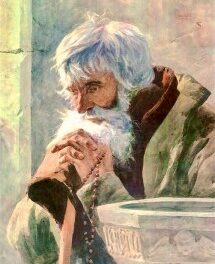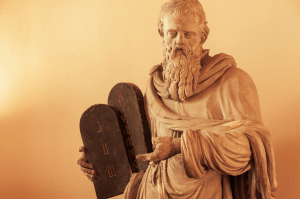We support our Publishers and Content Creators. You can view this story on their website by CLICKING HERE.
You see, the poet haunts, casting a spell on the reader or listener. The power of the word in poetic form is nearly incomprehensible. Especially when paired with melody, the effect is extraordinary. This means that a songwriter, a hundred years down the road, having read only small, peripheral portions of his poetry, and having understood even less, can attempt to write a song in meaningful conversation with the poet.
In spite of an education with a focus on both good and great books, I was, appallingly, not familiar with T.S. Eliot until the age of twenty-six, when a short-lived love interest recommended I obtain a collection of his works. In Portland’s famous Powell’s City of Books, while on my last youthful road trip hurrah, I did just that. I have now long relished, far past the ashes that came of that dollar-store candle of a fire, that it accompanied me on a cross-Canada tour in a summer into fall, and now quaintly sits among the hardcover riff-raff that is my used book collection.
But while I did read some full sections of it (parts of it on a ferry from Cape Breton to Newfoundland), I do not know much of T.S. Eliot—not the man, nor his works. I know he was deeply sad, I know he had a religious conversion, and I know that many, many say he is a “great”… and that I feel the same.
My own familiarity is cursory at best, and pretentious at worst—as is the morbid pattern of the modern young “intellectual.”
But this proves rather than disproves the power of the poet, as I am about to argue. I do not humiliate myself for nothing!
You see, the poet haunts. He casts a spell on the reader or listener, as Dana Gioia has frequently and wisely articulated, echoing Plato’s lasting fascination with the “muse.” If the poet cannot charm, then the poet is no poet. It is inherent to the craft.
But what does this mean?
It means that a songwriter, a hundred years down the road, having read only small, peripheral portions of Eliot’s poetry, and having understood even less, can attempt to write a song in meaningful conversation with him, because the undercurrent that binds poet and reader or listener transcends the external language and charms and changes that reader or listener.
In an almost surgical manner, poetry penetrates the core of a person in an immediate, visceral way, “bypassing the dragons of the intellect.” One line can change a life, as only recently yet another conversation I had proved. The non-lover of poetry—many of them if not nearly all—finds a way yet to love a particular poem, and to adopt it even as a central reality, a scaffolding of sorts, for the rest of his life. That is precisely the substance of the conversation I just had. It is not uncommon to ignore, dislike, or even disdain poetry generally, and yet to cherish a line of poetic wisdom, as if permanently tattooed on one’s chest as defense against the ravages of life.
The power of the word in poetic form is thus nearly incomprehensible. Especially when paired with melody, the effect is extraordinary. True poetry adheres to the inner bones of being in a way no other kind of language can, and then absorbs deeper into the marrow. It is true food to the mind and spirit.
Such powerful lines are frequently overused or misused, however, and Eliot’s final lines in his poem, The Hollow Men, which many will recognize, are no exception:
This is the way the world ends
This is the way the world ends
This is the way the world ends
Not with a bang, but a whimper
This is the great tragedy of poetic brilliance—that the same freshness and perspicacity that made it brilliant, in time, from overuse and misuse, can become unjustly cliched, particularly in the mouths or on the keyboards of pretentious intellectuals or propagandists. These lines seem to have somewhat suffered this fate, but in so doing they share a strange badge of honour with “I love you” and “Veni, vidi, vici!” and “For God so loved the world…” The strangest yet greatest possible legacy of the poet is for one’s words to become the world’s messy common patrimony.
And while that which comprises patrimony is often subject to eventual and varied states of neglect and vandalism, there are always those new persons to once again see the glisten of abiding, fresh truth and greatness beneath the layers of soot. Only when it is completely forgotten can it be completely trampled, which is its only true death.
Until then, each generation is invited to answer the beckoning of the buried poet into the conversation of the spellbound, charmed spirit, where some of the deepest and most mysterious human resonance can triumph. In answering, the lines can perhaps again glisten—and produce new lines that show forth the eternity of truth as it relates to the present, as part of the broad human conversation that straddles millennia.
Recently, I wrote the song, “Eliot,” on a sunny day in the backyard when all was well with me. I have often been sad before writing a sad song (and sad songs are my fitful patrimony); but I almost resisted writing this because it was so opposed to my disposition that day. As is often the case with the muse, however, the song seemed to write itself, and I merely humoured it. I entered into Eliot’s words, and those words, like fire to the fuel of the present’s shocking, relentless tragic events—and our seeming difficulty in responding to it all—brought forth a new iteration in a song.
In a time of global viruses, authoritarian threats, racial murders and riots, economic ruin, the collapsing of the family, vast deaths of despair, animosity between neighbours, the selling of baby body parts, and the cruel disregard of the elderly—the world is not alright.
But Eliot knew that in 1925. Blessedly, we have clung to his wisdom as a piece of our own ragged patrimony, knowing we would need to continue to access it for a time like ours. Both diagnostic and prophetic, like the vocation of many poets before and since, Eliot’s words—in their proper full context in The Hollow Men—deserve a new, enchanted, haunted hearing among us.
Perhaps that new hearing can begin, today, in conversation, in song:
“Eliot”
Is this the way the world ends:
With a whimper, not a bang?
Mediocre villains;
Nonchalant decay?
Is this the generation
That mocks at Noah’s ark?
Dancing while it’s raining,
Then drowning in the dark?
It’s funny how it feels like
The world is turning fine;
Balanced on its axis,
Keeping perfect time.
Is this the generation
Where the cosmos start to shift?
And all we do is shrug and sigh
While falling off that cliff?
Eliot, how’d you know then
That we’d end up just like this?
Laughing while the world burns,
Betraying those we kiss?
Is this the generation
Where we see just what we are?
In a faithless, fallen world
Will we fight or join the ranks of fallen stars?
This essay was first published here in May 2020.
The Imaginative Conservative applies the principle of appreciation to the discussion of culture and politics as we approach dialogue with magnanimity rather than with mere civility. Will you help us remain a refreshing oasis in the increasingly contentious arena of modern discourse? Please consider donating now.
The featured image is courtesy of Pixabay.

 Conservative
Conservative  Search
Search Trending
Trending Current News
Current News 






